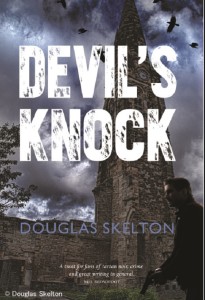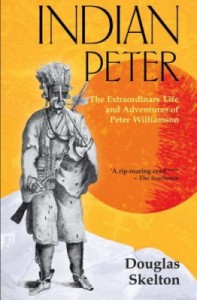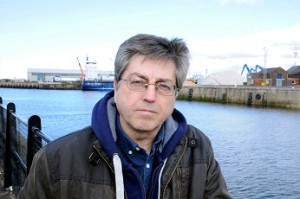Devil’s Knock – Douglas Skelton Q&A
Today I am delighted to be able to welcome the Douglas Skelton to the blog. Douglas has just released the third novel in the Davie McCall series, Devil’s Knock, and I was keen to discuss what we could expect from Davie this time around.
 What I would like to discuss is the new book, Devil’s Knock. However, before we get there, would you like to set the scene and tell me about Davie McCall?
What I would like to discuss is the new book, Devil’s Knock. However, before we get there, would you like to set the scene and tell me about Davie McCall?
It’s the third in the series – the others being Blood City and Crow Bait – all set in Glasgow in the twenty years leading up to the new millennium. Davie’s a hard man with a heart but only a very few of his closest friends – and the readers – know that. To everyone else he’s a thug, a piece of muscle, working for his old pal Rab McClymont but underneath that there’s a haunted man who really doesn’t want to do what he’s doing but is trapped by the fact that he’s really quite good at it!
And how do events in Blood City and Crow Bait lead us to Devil’s Knock?
It’s now 1995 and Davie’s been scarred both physically and mentally by the events from the first two books. The Glasgow underworld has changed, become more vicious, thanks to drugs. Davie himself is colder, harder to reach. Big Rab is even more powerful but still open to being challenged by other factions, in this case the Jarvis Clan.
And to Devil’s Knock its-self – without asking for spoilers, what can we look out for in the new book?
The street war that the police have feared would come finally erupts. Davie’s caught in the middle. He’s colder but he still adheres to his code – don’t hurt women, children or animals, don’t involve civilians. He refuses to kill, still won’t use firearms. That makes him a target. He’s also helping an old pal whose grandson has been implicated in the bloody murder which kicks the whole thing off.
Does it become easier to write for characters by the third book in a series?
Davie’s always hard to write. I like writing dialogue but he’s so taciturn, everything with him is internal. As for the others, I don’t think it should ever become easy. In a series like this they have to change. They’re ageing in real-time, bad things are happening to them, so they must change. There are certain constants, of course, but I think you should always be looking to make your characters grow in some way. Not always for the better, though!
Davie seems to hold dear his personal moral code, despite moving in some nasty circles – is this fun to plot for him? I am almost envisaging you saying “right today he is going to encounter someone who has been beating his wife” then set Davie off on a course of retribution.
I’m dealing with a morally suspect world but I wanted to have my anti-hero as someone who has his own strict moral code, as I mentioned earlier. He may be a criminal and a violent man but I wanted the reader to root for him. These are not documentary accounts of Glasgow criminal life, they are thrillers, and you need characters the audience care about, if not wholly admire.
When looking through your previous publications I notice several volumes of true crime books. What prompted the switch to fiction?
I always wanted to write fiction – and some police officers say I’ve been doing it for some time. I’m also drawn to the dark side of life even though I’m of a naturally sunny disposition. That sound you hear are the people who know me guffawing. I’d done 11 true crime and Scottish criminal history books and by the time I reached Glasgow’s Black Heart, a history of the city’s crime, I felt I’d done everything I wanted to do. There are a couple of historical true crime cases I’d like to write about sometime, though. The true crime tag has never left me – I’ve been doing some short features for STV Glasgow on some older cases.
 When writing the true crime how did you choose your subject matter?
When writing the true crime how did you choose your subject matter?
The first one I did was a casebook of fairly well-known Scottish murders but the next one landed in my lap. It was an investigation of a huge miscarriage of justice which eventually took up over ten years of my life. The others were either suggested by publishers or something I really wanted to tell, like Indian Peter, which I thought was a fascinating tale of true life adventure mixed with crime. As for the individual cases, there had to be a story to tell, something perhaps unusual or of legal or forensic interest.
While researching material for the true crime books did you uncover any incidents which have made the leap into the fiction titles?
Naturally what I’ve learned in my researches and the years I spent investigating cases for Glasgow solicitors have informed what I’m writing now but I don’t purposely use actual incidents in the fiction, although in Devil’s Knock there is one scene in a supermarket car park. However, that was born out of a character flourish rather than based on any real-life incident and apart from sharing a similar location it bears no similarity to actual events. None of the characters are based on real-life figures.
As a fiction reader I can tell myself that some of the ‘darker’ books I read are ‘just a story’ and that none of what I am reading actually happened. However, if you are researching true crime collections is it hard to accept that the horrors you are uncovering about DID occur and that the individuals concerned really did meet with a grim fate?
It can be fairly gruelling. While writing the first one, Blood on the Thistle, I did end up having nightmares. However, I was researching and writing much of that in a very tight timeframe. However, you have to retain a certain amount of journalistic detachment. Having said that, I stopped writing about more modern crimes because I didn’t want to upset relatives of the victims or the accused. That was when I turned to historical crimes.
I turn now to my recurring question which I ask most of my guests on the blog: why do the readers of crime fiction love a serial killer story?
I don’t do serial killers in fiction, although there was a hint in Crow Bait, but as to why they’re popular, I think it’s the bogey-man syndrome. We love to be scared and serial killers in fiction generally have that feeling of other wordliness that terrifies us so much. In classic crime fiction – the tea and scones school – the murderer is usually someone the victim knows. It’s safe in a way. But serial killer fiction taps into the stranger danger that we’re taught about from a young age. It’s the shadow in the dark, the face at the window, the footstep in the night.
On your Website you are promoting an upcoming event in Edinburgh: Assault n Battery vs Assault n Sauce – it is hailed as a rematch but what is it? For the record I will be Team Battery as I hail from the West!
It’s a panel of East Coast writers facing West Coasters in a fun game hosted by Craig Robertson. We did it last year in Glasgow and naturally the best coast won. Now the team from the East have the chance to restore their tattered honour! Seriously, it’s just a laugh. Craig makes the scoring up as he goes along and it’s mostly an excuse for us to slag each other off. Good to hear you’ll be supporting Team Battery, though. I think we’ll need it as we’re on foreign soil.
I had my first taste of a book festival last year when I got to visit Bloody Scotland. I see your name on the schedule this year, what are you showcasing and what other writers are you hoping to see (assuming you will have the opportunity)?
I’m on this year with Caro Ramsay and Michael J. Malone and it promises to be a lot of fun. Michael’s Beyond the Rage has a protagonist that is on the wrong side of the law, while most of my characters are crooks. Caro will be there to bring some semblance of law, if not order. I’ll see as many other authors as I can. I’ll catch Neil Broadfoot and Craig Robertson in whatever they’re doing. I may even watch the England v Scotland football match, although I’m not a fan of the game. The event on the Friday called Who’s Crime Is It Anyway? looks like an absolute belter.
What do you enjoy reading? If you were to take a picture of your bookcases which genre or authors would feature most frequently?
I’m afraid I’ve got to be predictable and say crime fiction. I’ve read it since I was a teenager. I’ve also got some true crime in there and some non-fiction. I’m a big fan of American authors – Lehane, Crais, Pelecanos – and I’m heavily influenced by Ed McBain. But there’s Agatha Christie in there, too, as well as Edmund Crispin, my favourite of the ‘traditional’ school. And John Mortimer – you can’t beat Rumpole.
Devil’s Knock is published by Luath Press and is available in paperback and digital format. http://www.amazon.co.uk/Devils-Knock-Mccall-Douglas-Skelton/dp/1910021814/ref=sr_1_sc_1?ie=UTF8&qid=1434756916&sr=8-1-spell&keywords=devilsknock
Douglas is on Twitter : @DouglasSkelton1
And is online at http://www.douglasskelton.com